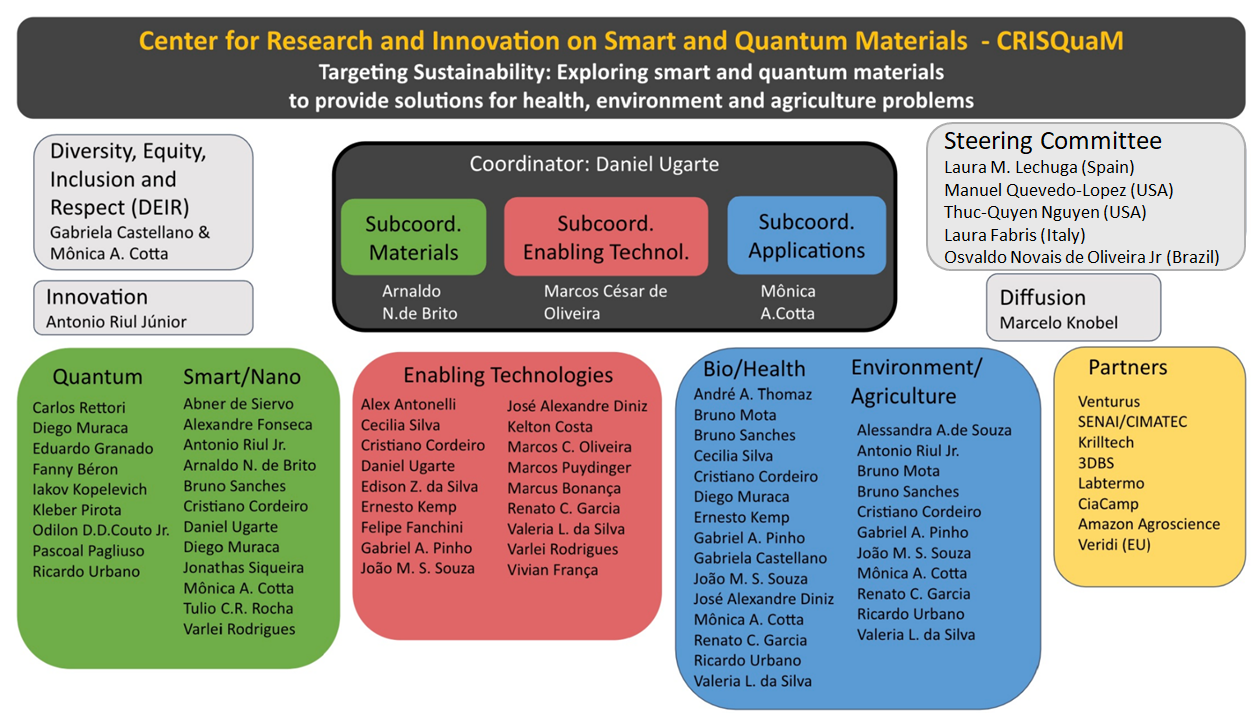BV-FAPESP: research projects supported in this Center
CRISQuaM in the Media: news about the center
CRISQuaM aims to explore the synergistic development of fundamental and applied science to create new materials with high potential for the construction of devices and sensors to address technological challenges related to sustainability, climate change, precision agriculture, ecology, and health. To achieve these goals, we have assembled an interdisciplinary and collaborative research team, integrating expertise across various scientific domains, researching novel materials with high innovation potential. By combining original synthesis methods, advanced characterization techniques, theoretical approaches, computational simulations, quantum technologies, and device construction designs, we aim to drive advances in smart and quantum materials, promoting scientific excellence and technological development. With this, we plan disruptive innovations in instrumentation—including hardware and AI-based tools—as well as in quantum technologies, biomedical devices, and signal processing, in addition to plant bionics, exploring plant-pathogen interactions. Besides research activities, we plan intensive actions in education, dissemination, and communication for the general public, as a modern society should be aware of the challenges humanity faces and how research and technology are essential for responsibly utilizing the planet's limited resources. CRISQuaM's Innovation activities are accelerated through partnerships with several companies in related technologies, many of them Brazilian. Finally, all activities of the Center are managed in accordance with diversity, equity, and inclusion goals and best practices.
The Center brings together scientists, engineers, and innovators in a collaborative effort to apply materials science and quantum technologies at the cutting edge, designing new materials and nano(bio)sensors for advanced diagnostics. The Center has a team capable of producing a wide range of (nano/micro) materials, along with precise chemical and physical characterizations using modern techniques (synchrotron, advanced microscopy, magnetotransport, magnetic resonance, optics, etc.). In addition, the team offers various options in enabling technologies, including miniaturization, processing, and additive manufacturing, as well as instrumentation, quantum sensing, and electronics development. Data analysis will employ updated approaches (numerical simulation, classical and quantum machine learning, and quantum optimization). Applications at the knowledge frontier will address urgent sustainability needs in environmental areas, precision agriculture, plant bionics, and biomedical interfaces, contributing to the development of local technologies in close partnership with the Brazilian industry.
The organization of the Center is based on three pillars — Materials, Enabling Technologies, and Applications — together with partner companies, as described in the figure below.

2025-07-28
Researchers reanalyzed the skull musculature of coelacanths, a group of fish that has existed for 400 million years, and concluded that many structures had been incorrectly described. The study was published in Science Advances by researchers from the University of São Paulo and the Smithsonian Institution.
2025-07-28
During the pandemic, a preference for domestic vaccines or those from countries such as the United States, Germany, and the United Kingdom was observed for the first time. This phenomenon, known in marketing as the country of origin effect, is usually associated with products that require consumer research before purchase or that have a long tradition in certain countries, such as Swiss chocolates. However, it had never been linked to free vaccines.
2025-07-23
An analysis of data collected over 20 years in the upper stretch of the river shows a 50% loss in economic gains from fishing. Native fish have become smaller and smaller. Conversely, invasive species, which have a lower market value, are becoming more abundant. The phenomenon has been accompanied by a loss of vegetation cover on the riverbanks.
2025-07-21
“Negative balance” of biome protection recorded between 2022 and 2024 could jeopardize Brazil’s international goals, warn Brazilian researchers and their international collaborators in the journal Global Change Biology.
2025-07-21
Economic activities that depend directly on marine resources account for 2.91% of gross domestic product and 1.07% of employment. However, when the indirect effects of their linkages with other sectors are considered, the impact increases to 4.45% of employment and 6.39% of the country’s GDP.